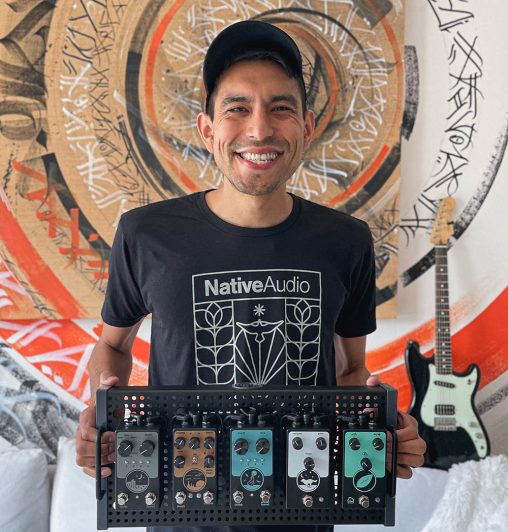
Mike Trombley, a Wright State electrical engineering graduate, founded NativeAudio out of his love for engineering, music and his heritage.
A love of music and a talent for tinkering with electronics inspired Mike Trombley, a Wright State University electrical engineering graduate, to start his own business that is more than a business. It has the extra benefit of raising awareness of his Native American culture and keeping his tribe’s language alive.
Wright State’s Career Services will host Trombley for a workshop on building a professional network and connecting with Wright State alumni on Tuesday, Nov. 14, at 1 p.m. in 106 Millett Hall.
He will also participate in an informal meet-and-greet with students at the Asian and Native American Center.
Trombley’s personal and professional journey started in his native Montana, where he was born and raised on the Blackfeet Reservation. When he was in grade school, he and his family moved off the reservation and went elsewhere in Montana because his mom wanted to pursue a degree.”
A couple of years later, she met a man who would become his stepfather and who was from the Dayton area. The new family moved to Troy, where in high school Trombley came upon the first of his passions when he started playing guitar.
“But I was one of those kids who didn’t know what I wanted to do,” Trombley said.
Trombley soon discovered a second passion.
“I had a knack for figuring out how things work,” he said. “I didn’t realize until later that that was an occupation. Weirdoes like me become engineers.”
He enrolled in the Electrical Engineering Program at Wright State in part because,” he said, “it was local and a quick commute” and developed an interest in music electronics.
Because he played guitar at local venues, including churches (his stepfather is a pastor) Trombley got to know others in the local music community.
He drew attention not so much for his guitar playing but because of his guitar devices. He custom-built effects pedals, electronic devices that manipulate an instrument’s sound.
“I saw that there was a demand for these,” he said.
Around the time he earned his bachelor’s degree in electrical engineering in 2015 from Wright State, he approached a music store in Troy that agreed to carry his effects pedals. That’s when he realized he had more to learn.
“It’s one thing to know how to build it,” he said, “but another to sell it and run a profitable business. That’s what I’ve been doing these past eight years — learning the whole business thing.”
Trombley started a company called Red House Electronics, the name under which he built and sold the effects pedals. What made his devices stand out among others, he said, was that their designs were influenced by his Native American culture.
In the meantime, Trombley earned a master’s degree in electrical engineering from Wright State in 2017.
To strengthen the connection between his culture and his products, in 2018 he rebranded by changing the company name to NativeAudio.
“From that point, I didn’t necessarily see myself as an electronics company building stuff for the fun of it,” he said. “I was able to share my culture through sound.”
“This was really cool because it allows me to do two things,” he said. “One, I can exercise my music capability and electronic capability to connect with musicians. Second, I’m able to continue the language and the ethos of my culture through my products.”
For Trombley, Native Audio is the perfect intersection of music, electronics and culture.
“I’ve been able to connect with musicians who might not otherwise come across my culture,” he said.
For instance, the name of one of his products is Kiaayo, which in the Blackfeet language means “bear.”
“It’s cool to have someone come into a music shop and ask for it by name,” he said. “They’re using the language of our people and keeping the language alive.”
The connection with preserving his native language goes beyond a mere name. He donates a portion of NativeAudio’s sales each month to the Piegan Institute on the reservation that teaches children the Blackfeet language.
Trombley builds his effects pedals in his Troy home with the help of Micah Kemplin, one of the musicians he connected with in 2013.
Trombley said Wright State did well by him.
“Wright State had an endless amount of resources for me to get a proper education while also applying a lot of practicality,” Trombley said. “Wright State engages engineers in practical experience.”

 Walking through open doors
Walking through open doors  Adventures await
Adventures await  Wright State to expand nursing facilities to meet workforce needs and prepare more graduates for in-demand careers
Wright State to expand nursing facilities to meet workforce needs and prepare more graduates for in-demand careers  Wright State student-athletes make a lasting impact on local family with more to come
Wright State student-athletes make a lasting impact on local family with more to come  Wright State names Rajneesh Suri dean of Raj Soin College of Business
Wright State names Rajneesh Suri dean of Raj Soin College of Business 